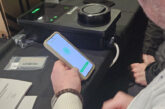
Andy Reakes, Director of Growth & Development for JIB and ECS, explains how the organisation’s remote invigilation system offers a more flexible service for people taking their industry assessments.
January 2021 was an uncertain time for the world. The UK was in the grip of a third national Covid-19 lockdown with businesses, public buildings and shops closed. Our ability to move around and visit places – for business or pleasure – was severely limited.
The Joint Industry Board (JIB) moved swiftly throughout the pandemic to support companies and individuals with getting to site in a compliant manner, provided guidance on how to work in line with site operating procedures, provided flexibility for working patterns and updated insurance cover to ensure those who could still work were able to do so.
While meetings and some classes could take place online, for those working towards a qualification, pursuing an apprenticeship, or undertaking any kind of assessment, there were concerns about how tests and exams could be carried out fairly and in a compliant manner with national restrictions.
ECS card holders are required to pass the ECS Health, Safety and Environmental (HSE) Assessment or hold a valid exemption. This would require attending one of the centres located around the UK but, during the pandemic, travel was restricted, and centres had faced a number of challenges, from closure to severely limiting the numbers and way in which assessments were being undertaken.
In response, the JIB launched a pilot for an online invigilation service for its ECS HSE Assessment. Initially available to employers from January 2021, it was extended to individuals, through their MyECS account, in November of that year. It was then further developed to include a suite of assessments including: Fire; Fire & Emergency Lighting; Security, Fire & Security; and Network Infrastructure Awareness.
Upgrades to the system have been ongoing since its launch, to simplify processes and improve user experience. In addition to on-screen guidance and written instructions before the assessment, there’s a video available on the ECS website with step-by-step instructions on how to set up and undertake an online test. This remote invigilation system has been incredibly successful with more than 50,000 assessments completed using the simple, online software.
Greater flexibility
Centres are still available for those who prefer to take the assessment with an invigilator and, in some cases, this may be more appropriate. However, the remote invigilation service means ECS card holders and employers now have the option to take their tests without having to attend in person. As well as saving time and travel costs, this means reduced waiting time and less need for advanced planning.
This system is powered by world class technology for automated invigilation, using Artificial Intelligence (AI)-powered, behavioural monitoring and verification tools. Candidates have the freedom to complete their assessment, securely and safely, at a time convenient to them, with no programs to download or browser extensions needed. All that’s required is a laptop or desktop with a webcam and a stable internet connection.
Instead of an invigilator watching a candidate take their test, automated online monitoring software using an AI program is used to verify the identity of the person and then to constantly monitor and record their performance. The monitoring software makes use of the candidate’s webcam, microphone, keyboard and mouse. If at any time the system detects unusual activity during the assessment, the candidate will be automatically flagged for moderation and can then be reviewed by a member of the ECS team.
Taking your assessment
To take an ECS assessment using the remote invigilation system you will need to be in a room where you will not be disturbed. There must not be anybody else in the room with you for the duration of the test. You will need a desktop or laptop computer set up in a place where you will be comfortable. The best option is to sit at a table or desk.
If you are using a laptop, make sure that you have sufficient power to complete the test. It is highly recommended that your laptop is connected to the mains power supply. The computer you are using will need a working webcam pointing directly at you, so that your face is in the centre of the screen. Ensure that there is a plain background behind you.
You will also need a stable internet connection and an up-to-date web browser, such as Chrome or Edge, running on the computer you are using.
We recommend that the computer you use is a standalone with a single monitor connected to it. If you are unable to disconnect any additional monitors from your computer, you must remember to remain solely in a single browser tab and not stray anywhere else on the computer. If you do not stay in the single browser tab, where the assessment is available, the system will fail you automatically.
50,000 online assessments
Arthur McKay, a JIB member company and presently part of the Atalian Servest Group, was one of the team that recently sat the 50,000th HSE assessment using remote invigilation.
The company is a worldwide provider of hard and soft facilities management as well as offering smart and integrated services for mechanical/electrical, data cabling and networks solutions in the industry.
Mike Stark, Director of Data Cabling and Networks for Atalian Servest AMK, said: “ECS remote invigilation revolutionises assessments, saving businesses invaluable time and money. By seamlessly integrating cutting-edge technology, it ensures a secure, convenient and cost-effective experience.
“Embracing this system means streamlined processes, reduced administration and significant cost savings on physical infrastructure and personnel. Companies now invest more in their core activities, driving innovation and growth.”
He concluded: “Embracing ECS remote invigilation isn’t just a choice, it’s a strategic advantage, empowering businesses to focus on what truly matters, fostering efficiency, and maximising profitability in today’s fast-paced world.”
Get more details on remote assessments from JIB and ECS here










